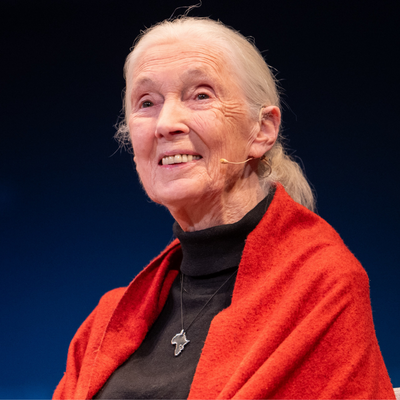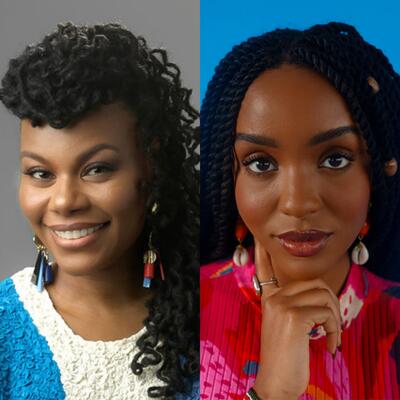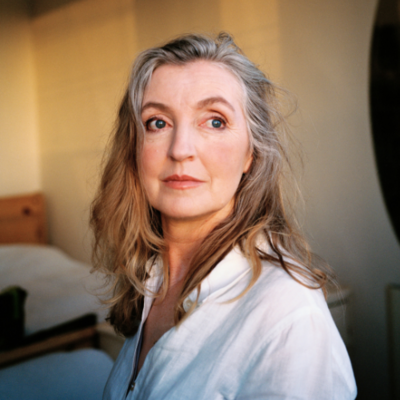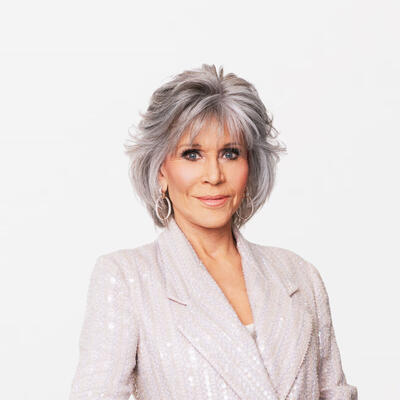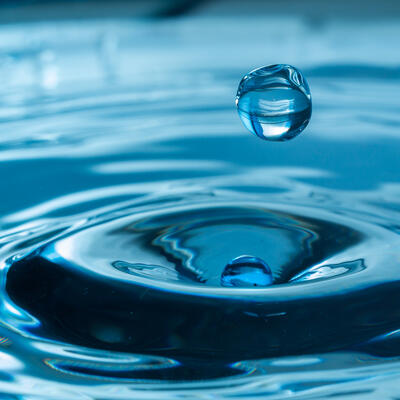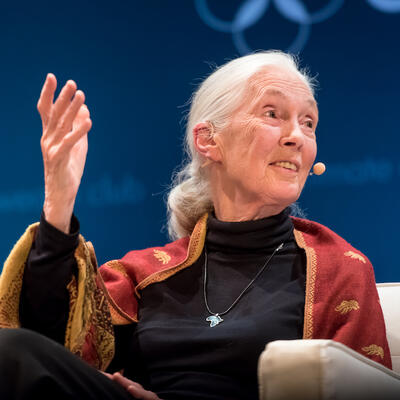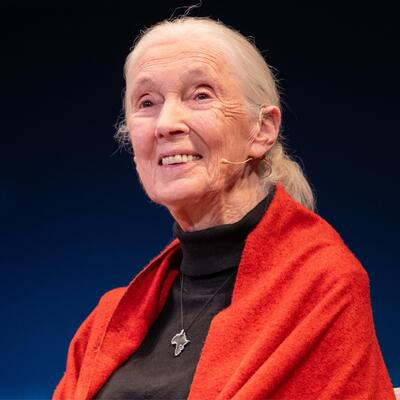
Jane Goodall: Celebrating 90
Guests
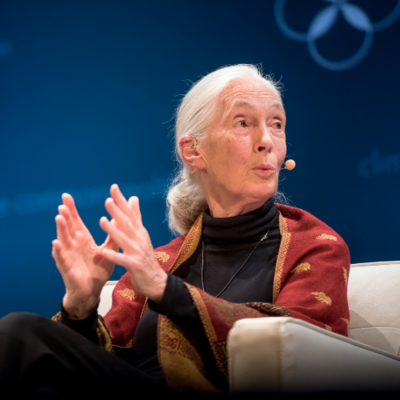
Jane Goodall
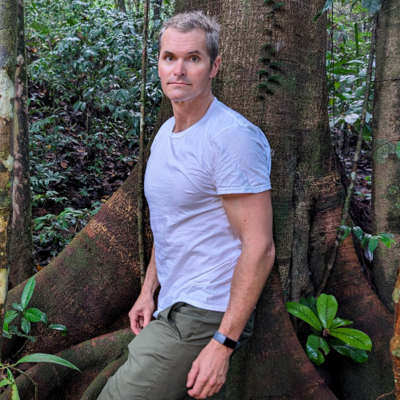
Rhett Butler
Summary
Environmental icon Jane Goodall is celebrating 90 years of life, and she’s not backing off of her passionate commitment to nature. Goodall says the reason we are facing ecological crises in the first place is because, “we've lost the connection between the clever brain and the human heart, which is love and compassion.” The question, she says, is “Do we want to be the one species who comes onto the planet and destroys it?”
Jane Goodall is still touring the world, firing up audiences and inspiring people to care about the natural world. This time, she has a special message: vote for nature. This year has been a big year for elections all over the world, including the upcoming US elections, where the environmental policies of each party are starkly different. Goodall says, “Vote for nature. Every single vote matters.”
It can be difficult to take action on climate change when the problem feels so big. To make it more manageable, Goodall wants people to think locally, “What do you care about there? Can you try and do something about that? Maybe you care about litter. Maybe you care about people in the street, homelessness, whatever you care about. See if you can find something to do about that problem.”
One way Goodall helps to get young people active in their communities is through a program she established called Roots and Shoots. The program, for youth from kindergarten through college, is highly localized. “s a group you choose three projects, one to help people, one to help animals, one to help the environment, and then you discuss what can we do to improve this in our community.”
Goodall says the program got its name from trees: “Think of your favorite tree. It probably began with a little seed. And when it started to grow, there would be little roots and a little shoot. And if you picked it up, it would seem so weak and powerless. And yet there's a life force, a magic in that seed, so that those little roots to reach the water can work through rocks and eventually push them aside. And that little shoot to reach the sun can work through a brick wall and eventually knock it down.”
Episode Highlights
2:44 - Jane Goodall on connecting with an audience
3:56 - Jane Goodall on why humans are the planet
13:23 - Rhett Butler on palm oil
19:14 - Jane Goodall on Roots and Shoots
20:49 - Jane Goodall on her stuffed animals
25:34 - Rhett Butler on financializing nature
36:22 - Jane Goodall on the current moment for women
40:46 - Jane Goodall on the vote to keep oil in the round
43:07 - Jane Goodall on the last adventure
What Can I Do?
Resources From This Episode (2)
Full Transcript
Note: Transcripts are generated using a combination of automated software and human transcribers and may contain errors. Please check the actual audio before quoting it.
Greg Dalton: I’m Greg Dalton.
Ariana Brocious: And I’m Ariana Brocious.
Greg Dalton: And this is Climate One.
[music change]
[Playback]
Narrator: In 1960, a daring young Englishwoman set out to sort fiction from truth. She had been warned, you'll never get near the chimpanzees. But she was determined to try. Her name, Jane Goodall. She was 26 years old and destined to make scientific history.
Greg Dalton: And make history she did. Jane Goodall immersed herself in the study of primates, and emerged with discoveries that challenged and changed what we know about our closest animal relatives. She’s been in the public eye ever since. First as an expert on chimps and then for her advocacy in support of the natural world.
Ariana Brocious: She’s a true icon. Greg, you talked with her on the show several years ago – and we were so excited to have her BACK on Climate One recently. She’s celebrating her 90th birthday this year and touring the world with an important message:
Jane Goodall: Vote for nature. Your vote matters. Every single vote matters.
Ariana Brocious: Of course the US election is just around the corner and as we’ve covered in previous episodes: the stakes are really high – for climate and everything else.
Greg Dalton: Right and the presidential candidates practically have polar opposite plans for energy and climate policy – the difference in emissions could be huge. So it’s no exaggeration that the impact of this election will last for decades.
Ariana Brocious: And beyond voting, Goodall is also really eager to get people involved in their communities. She urges people to do our part where we live – she believes that collective action even on a small scale is what leads to bigger change. She’s optimistic – and she exudes a real confidence that change is possible.
Greg Dalton: And she’s firing up audiences everywhere. Including here in San Francisco. Just last week, we met up in front of nearly two thousand people at the Sydney Goldstein Theater. And she brought along someone she really admires: Rhett Butler - the founder and CEO of Mongabay, an international conservation news site.
Ariana Brocious: They’re a sorta odd couple – she’s 90 years old, looking back at a lifetime of work in support of our natural world; he’s much younger, at the helm of an online publication. But they have this lovely friendship – and they both have a ton of energy and momentum when it comes to climate solutions. So today we’re going to spend the entire show bringing you that conversation.
Greg Dalton: And now, without further ado, here’s Rhett Butler and Jane Goodall.
Jane Goodall: I always feel connected, you know, when I come up to give a talk. I sort of open my heart up so that the talks I give are basically the same, but they're different depending on who I'm talking to. And that can only happen if you kind of open yourself to the feeling in the room. Okay. do this the time?Because I care about the future because I care passionately about the environment and wild animals, biodiversity, because I've got grandchildren and probably at least two of them will soon have their own children because I care about children. But most of all, it's the future of this planet. And do we want to be the one species who comes onto the planet and destroys it?
Greg Dalton: Right. And in almost a couple of generations, we're the only species that kind of destroys our own home with, uh, this intellectual brain that we think is so clever. if we're so clever, why are we destroying our own home?
Jane Goodall: Because we've lost the connection between the clever brain and the human heart, which is love and compassion. The divide between the haves and the have nots is getting wider and wider. And the few people who have unsustainable lifestyles are doing a tremendous amount to destroy the, the environment. But then on the other hand, so is poverty. Poverty isn't talked about enough. But the really poor people, in, in the rural areas. They destroy the planet simply to survive. Cutting down the trees to make money from charcoal or timber in Africa, or to make more land to grow food for their growing families. And in the urban areas, they buy the cheapest junk food, because it's all they can afford. They can't afford as we three can. To ask, where did it come from? How is it made? Did it harm the environment? Was it cruel to animals like factory farms? Is it cheap because of unfair wages? They have to buy the cheapest to survive.
Greg Dalton: Poor people do desperate and damaging things and affluence. There's another kind of impact. You write and talk a lot about hope. You have a hope cast that I've listened to. It's very good. And I have a complicated relationship with the word hope. And you wrote a book about it. Um, you wrote that hope is misunderstood. It is often seen as passive. So what is hope? Is it a feeling? Is it a skill? And how do you access it?
Jane Goodall: Well, to me, if we lose hope, we're doomed, because if people, if everybody loses hope, particularly young people, what's the point of doing anything? If you don't hope that what you do will make a
Greg Dalton: Drink, be merry, tomorrow we
Jane Goodall: Yes, tomorrow we die. And then the wealthy who don't really care because they only care about the moment will carry on and as, as they are doing. But, you know, people come to me and they say, Well, I'm really depressed. What can I do? I'm just one person. The world's in a mess. And I say, stop thinking that you can change the world. Think about where you are in your own community. What do you care about there? Can you try and do something about that? Maybe you care about litter. Maybe you care about people in the street, homelessness, whatever you care about. See if you can find something to do about that problem. And then you'll find you can succeed, and that'll make you feel good, and you want to do more. And then you can understand around the world there's other people just like you, doing what you're doing, and then you get a feeling of, yes, we can.
Greg Dalton: We're joined today by Rhett Butler, producer and founder of Manga Bay, a new site with 900 journalists covering the intersection of nature and people. And I'd like to hear from you. How did you meet Jane, and how did you get connected?
Rhett Butler: It was kind of a funny story, so I, uh, opened my email one day and I had this, uh, message and it said, from Jane Goodall, and then it said, shh, this is the real Jane Goodall. I'm a big fan of Manga Bay, uh, I'm coming to San Francisco, would you like to meet up?
Jane Goodall: And,
Rhett Butler: going
Jane Goodall: I'd like to say that this man sitting here, what he has created with his growing team around the world. Uh, we know we're going through dark places in the planet today, and we need to expose those places. We also need to share the good things that are being done, the hopeful things.
And that's what you do with Monga Bay. And I tell everybody, if you really want to know the truth about a particular issue, go to Monga Bay. Congratulations.
Greg Dalton: you get this email, and do you think it's like some scam? What do you do?
Rhett Butler: Well, there were some references to, you know, to, to mutual people and things like that. So I, I suspected that it was, it was true. And there was an event coming up, um, Wildlife Conservation Network, where Jane was speaking. So there was that reference point as well. And so, you know, and she invited me to
Hotel where she was staying.
We, you know, I, I figured it was legitimate. And
Greg Dalton: legitimate. So,
Rhett Butler: took, took that risk.
Greg Dalton: yeah. So, okay.
So, you know, Environmental journalism can be can be dark and there's a real problem with the doom narrative so what are some positive stories about climate and nature? Uh that manga bay has covered Um, because you you cover the darkness and you also cover the light
Rhett Butler: There is so much doomerism and, and bad news in the world. You really have to make an effort to dig out those, those positive stories. And so, you know, one of the big stories is there are places where recovery has happened. So you've had places like Costa Rica, where you've had, you know, large scale conversion of forests that are now coming back from, so you went from like a 23 percent forest cover to 50 percent forest cover.
, there's also this movement to recognize, uh, indigenous peoples and local communities and the. Conservation outcomes that have been achieved on their lands. And so, , putting local communities at the center of conservation efforts has had these, um, you know, really wonderful impacts. that's kind of been a transformation, I would say, in the past decade where that's been recognized.
Um, and then, you know, we're here in Silicon Valley, the emergence of, of technology that gives us a better, a better, a clearer picture of what's happening in the world and telling us what's working and what's not working. Um, and so that's also been a very positive
Greg Dalton: Right and sometimes marine protected areas are one of the positive areas bill mckibben recently wrote about A very positive story about a quiet silent solar revolution in africa where distributed solar is being deployed It's not showing up in government statistics And it's it's reaching people who need it the most because they have unreliable energy.
They can't afford it it's really happening. Jane, what are some positive stories? 'cause you travel everywhere and talk to so many people.
What are some positive stories that you've seen
Jane Goodall: recently?
Well, it's amazing. I mean, I do travel all over the world, just about. And everywhere, just about every culture, there are people, more and more people, passionate about the environment. I think that's one very positive bit of news, that more and more people understand, more and more people want to do something about the climate.
well, I've got this youth program, and And the youth are in this program. They're passionate about making the world better and they care and they act. It's all about taking action. There's about 1, 500 groups in cross mainland China, for example. So this, this understanding of what we're doing to the planet is growing.
And that in itself is good news. In 1960, Gombe National Park, where I studied the chimps, was part of the great equatorial forest belt. And by the end of the 1980s, it was a tiny island of forest. All around were bear hills. The people were cutting down the forest to survive.
And that's when it hit me. That we need to help these people find a way of making a living without destroying the environment. And we started this program Tukari. Um, and it's very holistic, it includes not just restoring fertility to overused farmland without chemicals, um, and growing more food on that newly restored land.
But scholarships to give girls a chance of secondary education because they are the mothers affecting their Children
microcredit, which I feel is tremendously important so that poor villages can take out a tiny loan to start their own small, environmentally sustainable business. And then when they pay back, and it's over 90 percent that do pay back.
In our Tikari program. They're proud. It's mine. I did it,
So thanks to dr. Muhammad Yunus for that
Greg Dalton: that. Recently passed, yeah. Yeah, right. Um, yeah, I remember You know, when he spoke at the Commonwealth Club, he said, you know, why do banks make loans to people who have money?
They're not the ones who need money. You need to make loans to people who don't have money.
Jane Goodall: by the way, that program is in six other African countries now.
Greg Dalton: Mm hmm.
Jane Goodall: So it's raising people out of poverty.
Rhett Butler: of poverty. you know,
Jane Goodall: no more bare hills. The trees have come back.
Greg Dalton: So the nature of resilience. Well, one of the key areas and all these things we're talking about, food, deforestation, palm oil, the world's most produced vegetable oil. It's used in lipstick, cookies, laundry detergent. It's all over the grocery store. It's everywhere. Also a huge driver of biodiversity loss and destruction of rainforests.
The world wildlife fund publishes a scorecard of companies producing palm oil responsibly candy makers, Hershey and Mars. Leading the way uh smucker jams taco bell kfc and pizza hut lagging behind so Are we making progress on palm oil?
Jane Goodall: oil? I'd like to turn that to Rhett, because you've done a lot on palm oil.
Rhett Butler: palm oil's been something that we've covered for a long time, probably thousands of stories, and it's, um, the picture's getting a lot better.
So back in the 2000s, um, there was this large scale conversion of forests, especially in Malaysia and Indonesia, for, for oil palm plantations, and there's been this dramatic collapse in conversion of natural forests across both those countries, um, in Malaysia. Since about 2016, um, in terms of conversion for, for, for palm oil.
So the story has changed radically in a very positive direction. And a lot of that is because of pressure or, or you, I guess you could say shame. So, you know, the,
Greg Dalton: consumer pressure, policy, both?
Rhett Butler: So it's pressure on the big companies, which comes from a variety of places, but the largest palm oil trader in the world is a company called Wilmar and they adopted this zero deforestation commitment in about Uh, 2012 or 2013, and the rumor is the reason that happened was, um, the CEO's daughter came home and said, dad, why are you killing the orangutans? So very powerful message, but it's groups like, you know, it's activist groups, Greenpeace and, you know, global witness who are reporting on these abuses, and they're reaching people who then can influence these key decision makers and, you know, governments tend to lag. And so you have. This pressure on the companies, but the companies don't want to be the only actors.
And so, you know, you get government regulation company coming in, which ends up moving more of the market because you might have like, you know, 20 percent of the market of the players who start to implement these zero deforestation policies. But there's still a lot of damage being done by sort of the rest of the market.
And so that's where regulation comes in because it brings everyone along.
Jane Goodall: And you, you talk about this child coming and saying to her father, why are you destroying the planet?
That's the great thing about growing this youth program, because the, the mothers and fathers of all these children in our programs, you know, some of their, their families. Parents are politicians. And some of their parents are teachers. So, these young people are influencing older generations.
And, they're going to grow up to be the next decision makers.
Rhett Butler: Absolutely. And it's something that makes me optimistic for
Jane Goodall: Yeah, me too. My biggest reason for hope
Usually it's a daughter, by the way, who speaks to a powerful dad. There is a famous story in Silicon Valley, John Doerr, Big Venture Capitalist, similar thing. Dad, you caused this. What are you doing about it? It's often the daughters reaching their dads. , Jane, a couple of years ago, you co wrote the book with Douglas Adams, The Book of Hope, and you wrote about your four reasons for hope, one of which is the power of young people as well as the human spirit.
Greg Dalton: And the resilience of nature which we've talked about and the amazing human intellect but let's talk about young people. A lot of young people are scared And they're angry and
there's a real mental health crisis among U. S. youth. I don't know if that's international. So what do you say to young people who are, who are scared and worried about,
actually they're, they're going to live in longer than you and I will?
Jane Goodall: It's very simple. I tell them to join Roots Shoots, our youth program, because I've seen, I mean, I don't think it's a single child, and we are kindergarten through university, who doesn't join Roots Shoots, take an active role in it, uh, and feel hopeful about the future.
Hundreds of them have told me, I feel completely different now. I feel there is hope for the future. the reason it's called Roots Shoots is because if you think of a big tree, you love trees, I know. You probably love trees. Many people out there. Well, think of your favorite tree. It probably began with a little seed.
And when it started to grow, there'd be little roots and a little shoot. And if you picked it up, it would seem so weak and powerless. And yet there's a life force, a magic in that seed, so that those little roots to reach the water can work through rocks and eventually push them aside. And that little shoot to reach the sun can work through a brick wall and eventually knock it down.
So we see the young people. As the roots and their CHS and all the problems are the rocks and the walls, and they will break through.
Greg Dalton: We’re going to take a short break – and when we come back, Jane Goodall talks about the audience she cares about the most… children.
Greg Dalton: That’s up next, when Climate One continues.
Ariana Brocious: Help others find our show by leaving us a review or rating. Thanks for your support!
Greg Dalton: This is Climate One. I’m Greg Dalton
Ariana Brocious: And I’m Ariana Brocious.
Greg Dalton: And for today’s show, we’re bringing you my conversation with Rhett Butler of Mongabay – and the legendary Jane Goodall. Before the break we heard her talk a bit about her work with children.
Ariana Brocious: In 1991, she founded Roots and Shoots. The organization's goal is to bring together kids of all ages -- preschool to high school -- to teach them about environmental and conservation issues.
Kids: I want to be the next Jane Goodall!
I want to be the next Jane. I’m going to be a monkey…
Ariana Brocious: But it’s more than just an educational outlet. Goodall wanted Roots and Shoots to be a place where young people felt empowered to make change in their communities. So that’s part of the curriculum too.
Jane Goodall: I hope that some of you are here, who are here who don't know about Roots and chs, the program means that you choose yourself. We don't tell you what to do. But as a group you choose three projects, one to help people, one to help animals, one to help the environment, and then you discuss what can we do to improve this in our community.
And roll up our sleeves and take action. Or you might want to help, um, immigrants. And you will feel great when you know that around the world there are other people, other young people, doing the same sort of thing.
So, if you're, if, if young people are depressed, um, you know, tell them of course you're depressed, we know that things are not good, but I've lived 90 years and I've seen bad times and I've seen us get over them and somehow this indomitable spirit within us will get us through this along with this intellect which we have not used wisely.
But we are beginning to make a difference.
Greg Dalton: And just a quick note here: it wasn’t just me and Rhett Butler and Jane Goodall on stage. She also brought with her … a little stuffed cow, a little stuffed pig, and her beloved stuffed monkey, Mr. H, who travels with her everywhere...
Ariana Brocious: Yes! It was pretty adorable to see her on stage flanked by stuffies. But they weren’t just props, she used them to help illustrate a key point. And so important, and you will agree with me, is moving to a plant based diet, and that's why I take this is piglet, and this is cow, and what I want to say to you is It's not just that the huge areas of land that are cleared to grow food for them. It's not just that particularly cows, you know, the food goes in here and comes out the other end and that's methane gas. That's another vicious greenhouse gas that's, you know, affecting climate change.
But just think, each one of these animals is an individual. We talk about cows, cows,
This is an individual cow. And this is an individual pig. And I just met a pig called Pig Casso, not Picasso, Pig Casso.
Greg Dalton: Pig
Jane Goodall: Casso loves to paint. Her paintings are selling for over 5, 000.
Her biggest painting sold for 25, 000. And she lives in Cape Town, and she watched a person who rescued her from a factory farm, who's an artist, who set up an easel, And gave Picasso a brush in her mouth, and she started to paint. She loves it. As soon as she sees the bucket with paints, um, she comes running out. And she even dips the brush in different colors to make her, her marks. And the only thing she's really been taught is at the end she'll dip her snout in red paint and make her snout mark.
Greg Dalton: So, there's an initiative north of San Francisco in an agricultural region talking about changing the food system. It's called Measure J, and it intends to, um, to ban, basically, factory farms. And
judging by the number of signs all over that county, it's no, no, no, no, no, no, no, no, because of the potential jobs loss, ranchers are against it, um, it seems like the food system is so big and so powerful, yes, okay, if I eat a plant based diet, but the number of vegetarians is not growing in this country.
It's just not it's around three percent as for all the, you know climatarian and alternative proteins So, how do we change such a big food system? Especially when something gets on the ballot and there's this big backlash saying it's going to take away jobs.
It's going to hurt ranchers
Jane Goodall: compassion and empathy for animals is changing people, there's no question. And, um, the other thing which is positive, I mean, I've become a vegan, because I, I've understood the horrors that go on in, in dairy farming, and, uh Except they're
Greg Dalton: infants, young, newborns from their
Jane Goodall: and the, and the conditions they The mothers are kept in.
It's absolutely horrible. And the same with laying chickens. It's absolutely, they're in a tiny space like this, and their egg drops through a wire bottom. And I mean, I know chickens. And we have chickens in Africa. They have personalities. They're all different. , very different. We have a cockerel called Tyson because he attacks you every time you appear.
But anyway,
um, so that, that's one side of it. But I think Probably right now, I don't know if you agree with me, right, but more powerful is the devastating effect on the environment and the CO2 emissions, which come from the whole of agricultural farming, actually. And then when you realize the difference, when you get to permaculture, and you get to agroforestry, and everybody says, you can't feed more people like that, but it's actually, you can grow more food that way.
And we don't need genetically modified food.
Rhett Butler: I think a lot of people don't realize that about 80% of deforestation in the Amazon, which is the world's largest rainforest, is driven by cattle ranching.
So
it has this huge impact, not only on. And the other positive thing, you know,
Jane Goodall: And the other positive thing, you know, when I first became vegan. The food was revolting. I mean, it was just, you've got a wilted lettuce leaf or a bit of half cooked asparagus or something, but now You can't tell the difference. also some
Greg Dalton: Rhett, you've covered some positive news stories, you know, there's deforestation in Indonesia. There's also some positive things happening there with a sort of debt for nature swaps, where some of the money that Indonesia owes the U. S. federal government 35 million is going to be reimbursed Forgiven and used towards safeguarding, uh, reefs in Eastern Indonesia over the next decade,
Rhett Butler: Yeah, I mean, so this is part of a broader trend where there are new financial instruments that are available that are going into supporting conservation and also restoration. So it's, it's really important. And there's a growing recognition of the role that nature plays in addressing many of our planetary challenges, whether it's climate change, the availability of water, , so it's ecosystem services.
And so because a lot of decision making in the world is based around. finances or economics in order to reach certain audiences, you need to speak that language. So while some people would be opposed to the idea of financializing nature to engage, you know, government people or the UN or whatever, sometimes you need to put a value on things and just understand that that's sort of like the lowest level value.
There's also the intrinsic value and everything else, but you need sort of this starting point speaking a language that those types of decision makers use.
Greg Dalton: Right powerful new tools financial innovation early in his administration president biden Committed to setting aside 30 of lands and water in the united states by 2030 There's 30 by 30 initiative.
It's actually has its roots in eo wilson Saying we put aside half they kind of said let's try 30. It's happening internationally several states California has committed to these activities 30 percent of land 30 percent of water Critics have said the u. s. Plan is too inclusive of activities like ranching logging farming how are you feeling about our progress toward 30 by 30?
I mean, so the key thing about 30 by 30 is it's not 30 percent in national parks. It's much more inclusive. So it's about building constituency around protecting nature.
Rhett Butler: So that includes ranches, it includes, um, indigenous lands, it includes like a bunch of different interventions. So the term for it is OECMs for other effective conservation measures. So, you know, a wonky conservation term. But. you're not going to get 30 percent of the world off limits, you know, on that time frame.
So it's really about being, pragmatic and looking for opportunities and, and sort of reaching across political spectrum to find commonalities where people can agree we need to protect nature for our children and future generations, but we can do it in ways that are not necessarily excluding people from, from these seascapes and landscapes.
Greg Dalton: Right, I can't rope it off. No and also leveraging private landowners, right? Because we're not going to get it all done by by public lands
Jane Goodall: if we cannot find ways to protect the environment for the future, Then nobody should have any Children because there won't be a future.
We've got to understand that we've got to take action now. And if we all take action now, even with our own individual actions, the way we can influence people, um, then we can. I won't say change climate change. We can slow it down and slow down loss of biodiversity because the two are intertwined, right?
Mhm.
Greg Dalton: You mentioned you have a great grandchild on the way. If you were young today, how would you approach thinking of having children? Because some young couples are saying they're not. They're choosing not to. Fertility rates are dropping.
Jane Goodall: Well, that would have to be an individual choice but the answer is, you know, if, if you're thinking about having a child, get involved in programs to protect the environment for your child's future.
Greg Dalton: If you're going to do it, make the world for them.
Rhett Butler: much.
Greg Dalton: Red plastics are a problem a combination of cheap fossil fuels resulting in environmental harm uh about 175 uh, about how our countries have been working to develop a legally binding instrument on plastic pollution, hoping to wrap up negotiations this year.
Manga base published a lot of stories on plastics, microplastics hurting human health, bioplastics that are supposedly compostable. How are you feeling on the, on the progress we're making on the vast plastic problem?
Rhett Butler: I mean, I think progress is being made. There's certainly a lot more awareness. Uh, I don't think progress is fast enough. , my issue with plastic is, has always been like, why do we need to, you know, put a banana in a plastic bag in the last 10, 000 years?
I mean, it makes no sense to me. And, and why are we holding Coca Cola and Pepsi, the companies that are producing all this plastic, you know, holding their feet to the fire? about developing real solutions, because again, you know, it's a perishable product that doesn't need to last 10, 000 years. And so I feel like there's not enough pressure on those companies.
I mean, that's changing, but it feels like progress is very slow. And then the other side, if you're looking at sort of like the economic Part of the equation is that the fossil fuel industry is building out a lot of capacity for plastic. So the expectation is, is that, you know, demand is going to continue to grow for these products even if we see a reduction in demand for, for oil itself.
So I guess I would say that I'm glad there's more awareness. I'm glad there's more pressure, but it doesn't feel like we're moving quickly enough to actually address this
problem.
Greg Dalton: pressure, but it doesn't
You know, Rhett talked earlier about people who are powerful and companies receiving pressure from the outside or pressure from inside the family. Jane, you believe that, you know, change happens from inside that there's in the climate conversation.
There's lots of naming and shaming. Right. Judging people. Oh, you ate a hamburger. Oh, you flew on an airplane. Mm. Tsk, tsk, tsk. Um, not so sure I've done that and learned the hard way. There's people in my life that that doesn't work. People resent that. Uh, and so how do you, if change needs to happen from the inside, how can you ignite that internal change?
Jane Goodall: Well, you know, when I meet people, uh, who.
Who I think , I personally think I've got the wrong idea. You know, that they like climate change, deni and things like that. Uh, I find I have found, and I think I was always made this way, that it's no good pointing fingers and being angry and, and, um, making them feel bad. And especially in front of their peers 'cause they're not going to listen.
They're going to be angry, so instead of battling with their head and telling them why they're wrong and why what they're doing is affecting this, that, and the other, you've got to reach the heart. And the only way I know how to reach the heart is by telling stories. And in order to tell a story to a powerful CEO or government official, you've got to know a little bit about them to find the right story.
And if you find the right story, you may not actually know at the time that you did reach the heart. But sometimes you learn afterwards that that person changed because of that story.
you transcend a lot of the political and tribal boundaries that we have in our culture today. And you also talk with, , not just deniers, 'cause that's a really small part. Less than 10 percent at least of America, but you do talk with with Republicans who might have a different view Who don't might not deny climate change and not think it's a big deal or the markets will solve it or technology will solve it So, how do you reach those kinds of people?
Greg Dalton: Tell me about your conversations with republicans because so few environmentalists talk across divides these days
Jane Goodall: Well, you know, this year there have been 48 countries with major elections.
And of course, the people in power and politics have a role to play in what we do to tackle climate change and all the other dark problems we face today.
so many people are fed up with politics and they don't care particularly about any of that. Don't even bother to read about the candidates. They just don't care. So they don't vote. And the more and more people who don't vote, then the harder it will be to vote for those people who care the most about your future,
Greg Dalton: So.
Jane Goodall: vote for nature. Vote, your vote matters. I mean, this is the important thing. Every single vote matters. And you need to register, and you need to vote for the person you believe will be most likely to care about nature for you.
And the future of the planet.
This is the year where more people will vote or, uh, cast a ballot in the world, uh, than ever before. Elections have happened in India, Mexico, elsewhere. Uh, some have been the same party, state, so there's sort of continuity in policy. Sometimes there's been a change in power, change, uh, powers changed hands.
Greg Dalton: So what have you seen from a climate lens in the elections that have happened so far?
Rhett Butler: Oof, um, that's a
big question. Uh, I think it really just depends on the country. It's pretty
Greg Dalton: different. It's a change, yeah. Uh, we have to see what
Rhett Butler: Yeah, we have to see like what happens there because there are I mean, she's not president. I mean, she's
Greg Dalton: she's There's
Rhett Butler: We'll see. Yeah. I mean, there's an incumbent who is, has different viewpoints. So I think we have to see how that plays out.
Jane Goodall: And Brazil.
Rhett Butler: Brazil. I mean, Brazil is last year or two years ago, I guess.
And that's been, that's been a huge change. So deforestation had been trending upwards, but then it surged with the previous president. The new president came in and deforestation is falling by more than 50%. So more than
Jane Goodall: does that mean? That's more than 2,
Rhett Butler: what does that mean?
That's more than 2, 000 square miles less deforestation in the first, uh, year and a half ish compared to the previous year. You know, the previous president, and that has real implications for climate, for biodiversity, for the, for the, the entire structure of the Amazon Rainforest ecosystem. So really important.
And so if you want to get that systemic change, , you know, you have to, you have to influence people to top, you know, individual decision making is important, but, um, you know, you can only move the needle so far. And
Jane Goodall: And it's, again, individuals who are voting, so everybody has a role to play in getting the right people at the top.
Greg Dalton: I think that he has a prominent way of getting the right people at the top. As a girl, um, the US may finally elect a woman president in about six weeks. We don't know.
Rhett Butler: know. As an iconic woman
Greg Dalton: as an iconic woman who has done so much for women in science, what do you think about this particular
Jane Goodall: Well, all I know is that when I was very young, women wouldn't have dreamed, really, of doing what women are doing today. We still have further to go, but in some countries it's terrible, as we know, in Afghanistan and so on.
But women all around much of the world have a much stronger say in what goes on in their country, in their family. And I just was fortunate in having an amazing mother. And when I dreamed of going to Africa when I was 10, because I was in love with Tarzan, and he went and married the wrong Jane. And so, everybody laughed at me except my mother. She said, if you want to do something like this, then you've got to work really hard, take advantage of every opportunity, if you don't give up, hopefully you find a way. And many women have said to me, that encouraged me to do what I've done. And so, you know. Women now have as much opportunity to rise to the top as men do in some countries like the U.S.
Greg Dalton: you find a Tarzan when you went?
Jane Goodall: Well, I knew there wasn't a
Greg Dalton: I knew
Jane Goodall: Tarzan, I could never have met anybody like
Greg Dalton: but
Jane Goodall: lot of Mongabay's
Greg Dalton: have chosen. I could never have met anybody like that.
On people they don't know and places they don't go.
Rhett Butler: Well, it's really about making that connection. So as Jane was talking about storytelling, you need to do that storytelling. So if you're just throwing out statistics, like no one remembers that, you know, 10, 000 square square kilometers of rainforest is cleared last year in Amazon. They remember the stories around that.
So the community that fought back and, you know, Chase the oil company out and then restored the land. And so it is really about creating that connection. And so, , thinking about the products you consume, how they link back to things in the world. So the coffee you're buying or the, you know, the Oreo cookies, like where's that palm oil coming from?
And it's, it's amazing. Calling like that support line at a big company to get a few calls. It actually can have a big, big impact. So, you know, it is, it is creating that connection that is, that is really important. The other thing that Um, and then the other thing that is really relevant and ties in kind of with voting is, um, the whole idea of news avoidance.
So a lot of people are just bummed out by reading the news because it's so depressing. But there are types of news that people still read even if they are news avoiders. , positive news and solutions, solutions news. And so it's an opportunity to engage people. And then if you look at the political breakdown of news avoidance, , people who are on the right avoid very different types of news than people on the left.
So. So among news avoiders on the right, something like 70 percent avoid climate environment news. So if you want to engage those audiences, you need to tell those climate stories through types of news they don't avoid. So finance, economics, health, security. And so you may need to think about reaching audiences where they're at and, you know, conveying the importance of, protecting the Amazon from an economic standpoint or from a health standpoint.
Ariana Brocious: We’ve got more of Greg’s conversation with Rhett Butler and Jane Goodall after the break Coming up, at 90 years old, Goodall says there’s one more adventure she’s waiting to go on…
That’s up next, when Climate One continues.
Greg Dalton: This is Climate One. I’m Greg Dalton.
Last year the people of Ecuador did something remarkable. They voted to ban oil operations in part of the Amazon rainforest. This was a bold move: the economy is struggling by some measures – and yet voters decided to leave more than a billion dollars worth of oil in the ground in Yasuni national park… which is also home to some of the country’s indigenous peoples.
I talked about this with Rhett Butler and Jane Goodall, as part of our live conversation in San Francisco. I asked Goodall what that vote means…
Jane Goodall: The indigenous people understand that far more important than anything else is the environment. they understand perfectly well that we humans are part of the environment.
And not only we part of it, but we depend on it. We depend on it for, for food, for water, for clothing, for just about everything. But what we're depending on is healthy ecosystems. And I see an ecosystem as like a beautiful tapestry and all the different Complex intertwining of plant and animal species make up this tapestry, and every time a species goes from that particular environment, you pull a thread from the tapestry until it hangs in tatters, and the ecosystem will collapse, and that's happening around the world, and don't, I mean, shouldn't we at this point say how absurd that the environment is?
Has become a political topic. I mean, it's our, all of our,
Rhett Butler: that. It's
Jane Goodall: future.
Rhett Butler: And
Jane Goodall: You know, what we should be doing is not fighting over it, but by getting together from both sides, red, white, blue, yellow, whatever, whatever color the party is, and trying to use this intellect, which is really, really This makes us more different from the other animals than anything else.
, we've lost wisdom, but we've got this intellect. Shouldn't we all be getting together and working out ways of solving, how to feed the world, how to keep people in a good, in a good living condition, and protect the environment? If we all got together, instead of this ridiculous partisan separation.
What's going on is crazy.
Greg Dalton: you're, you're 90. And you've you've talked about your final chapter and what's what's the the great beyond, you know our culture avoids talking about death yet death is part of Integral part of nature part of indigenous cultures who have sorts of rituals around it So, you know as you as you look at the next decade, and I hope we sit here when you're a hundred Um, you know, how do you think about your next chapter?
Jane Goodall: Well, you know, there was, I was asked this question once in an audience much bigger than this, and this woman said, uh, something about, what did I, what was my next adventure? And so I thought, hmm, this is about, uh, four years ago. So I thought, what is my next adventure? And I thought for a moment, and I said, dying.
And it was kind of deathly harsh, and then a few titters. And I said, well, you know, when you die, there's either nothing, it's the end, or there's something. And things have happened to me in my life that I, I feel there is something. And if there is, I can't think of a greater adventure than dying.
Rhett Butler: dying.
Jane Goodall: before most anybody in this audience, I'll find out, I'll try and let you know. I
Greg Dalton: it's something that, yeah, I mean, I think it's life affirming to think we're in these temporary body tempera. Brett, do you think about it?
Rhett Butler: mean, I'm comfortable with the idea of dying. I'm not something I'm afraid of, but I think, I mean, maybe I'll take us in a more morose direction, I guess. I think like one of the things I would say is that there are a lot of environmental defenders who are putting their lives on the line every day who are You know, getting killed or, you know, harassed or imprisoned. And I think, you know, this is, this is a real problem. It's environmental, it's a, it's environmental journalists, it's indigenous leaders, it's activists, and it's something that doesn't seem to be getting a lot better. , it's consistently high. And so I think it's something that we need to be aware of, that there are people on the front lines who are, , you know, putting their lives on the line for our collective well being.
Jane Goodall: You haven't answered his question. What do you think about it?
Rhett Butler: question. Oh,
Jane Goodall: about dying.
Rhett Butler: or? Well, I keep my affairs in order, so if it happens, you know.
Greg Dalton: I
Rhett Butler: I want to, you know, leave things clean, so yeah.
Greg Dalton: it's
Rhett Butler: I'm prepared, yeah.
Jane Goodall: Made a will and had it legally signed and
Rhett Butler: I have all my passwords stored in a, in a system so I can just hand stuff over, you know, it's,
Jane Goodall: wife is so happy to hear
Rhett Butler: Yeah. It's good.
Greg Dalton: Jane, as you, you know, look back over all your decades since you were a young woman sitting in the Gombe, you know, what are some of the changes you've witnessed that you think are just like really positive, you know, cause we tend to focus, , on the degradation, the deforestation, the things that have, have gone darkly and badly because of this intellect, because of our greed, what are some real shining lights as you, but look back over the decades of doing this work and seeing so many, uh, situations of so many people.
Jane Goodall: Well. Um, after I'd been studying the chimpanzees for two years, my mentor, Louis Leakey, said I had to go and get a degree at Cambridge University, even though I hadn't been, uh, to college. He said, we didn't have time for an undergraduate degree. He got me a place to do a PhD. So I was very nervous, you can imagine. And imagine, I was told I'd done everything wrong. You shouldn't have given the chimpanzees names. They're just animals. They should have numbers. And you can't talk about their personality, their mind, or their emotion. Those are characteristics unique to us. Nor must you have empathy, because to be a good scientist, you must be coldly objective. So, fortunately, I had this wonderful teacher when I was a child, who taught me that in this respect, those professors were totally, completely different. Talking rubbish. And, um, That, that teacher was my dog, Rusty. You, you can't have an animal and not know that of course we're not the only beings on this planet with personalities, minds, and emotions. So, anyway, I got the PhD, but it was the chimpanzees who helped to break down the scientific attitude of 1960 and before. That we were separate from the rest of the animal kingdom.
There was a sharp line. And I suppose it was created by religion to start with. I'm not sure, but human arrogance. So, you know, the big positive change is that in country after country, we're getting better laws, better understanding of animals, uh, more people fighting against cruelty in one form or another.
That's something very, very positive. And it's still going on today. And, you know, as, as you said, Rhett, awareness about the environmental problems. That's growing. And with awareness, and with youth programs, and with young people wanting to make a difference, and the indigenous people that you mentioned, my goodness, they are so courageous.
And so determined and such amazing guardians of the planet. And so, uh, listening to indigenous voices is also something that's relatively recent. And is a really, really important good news for us. And, well, those are just
some of them.
Greg Dalton: that's amazing. I think that, You
know, the
Jane Goodall: Oh, and women. I should mention, you know, the fact that women around the world are, are getting in, Many countries are much better, uh, people are listening and accepting that women are As good as men, and sometimes better.
Rhett Butler: That was the little story I heard from an indigenous woman.
Jane Goodall: the, on the other hand, I must, there's a story I heard from an indigenous, uh, shaman in Latin America. I can't remember which country now, but he said, Jane, we call our tribe an eagle, and this eagle has two wings. One is male, and one is female, and we say we will only fly high. When those wings are equal.
Rhett Butler: For
Greg Dalton: and on that note, I'd like to thank Jane Goodall, Rep. Bettler, for joining us here at Climate
Rhett Butler: us here.
Ariana Brocious: And that’s our show. Thanks for listening. And if you’d like to see a video of our event with Jane Goodall and Rhett Butler, we’ve got it on our site: climate one dot org, or you can find it on Climate One’s youtube channel. Talking about climate can be hard, and exciting and interesting -- AND it’s critical to address the transitions we need to make in all parts of society. Please help us get people talking more about climate by giving us a rating or review. You can do it right now on your device. Or consider joining us on Patreon and supporting the show that way.
Greg Dalton: Climate One is a production of the Commonwealth Club, led by Gloria Duffy and Philip Yun. Our team includes Brad Marshland, Jenny Park, Ariana Brocious, Austin Colón, Megan Biscieglia, Ben Testani and Jenny Lawton. Our theme music is by George Young. I’m Greg Dalton.
